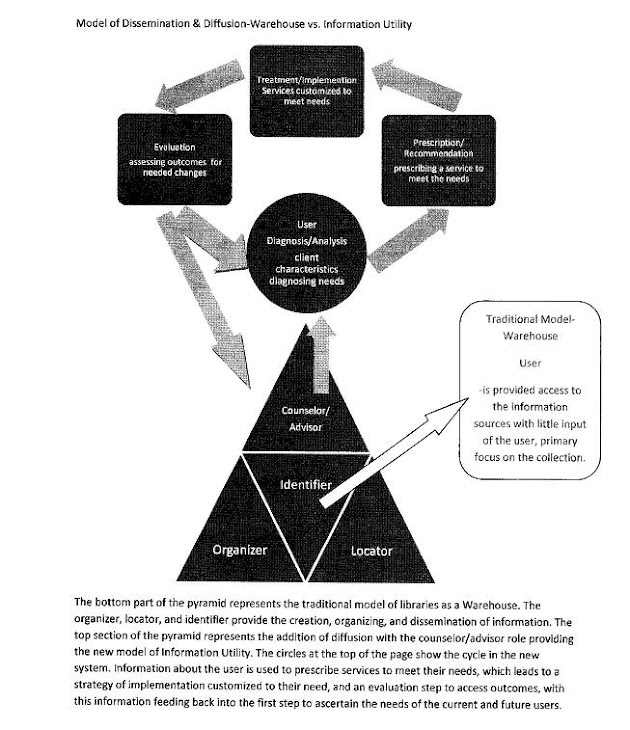The future of library dissemination and diffusion is embedded in the whole process of providing and using information. Libraries began as a storage facility for knowledge. As this evolved, a way of accessing the information became necessary so different ways of organizing knowledge were developed including the Dewey Decimal System, the Library of Congress System and other types. For example, Paul Otlet devised the Universal Decimal Classification system because he visualized all information as individual pieces of information and developed a system of storing this information on index cards. But he had to devise a system to organize it so he took the Dewey Decimal System and adapted it as he needed. He in many ways he even anticipated a mechanical devise (computers), the modern World Wide Web, and online access (Coletta, 2008).
Libraries began to share their stored knowledge leading first to simple dissemination-we have put this information out there on the shelves and organized it if you want to use it. Then some librarians and other professionals began to go a step further until the library began to center more on the user and providing more directed services. Diffusion became part of the equation. We provide the best information to the user we can and guide them providing education as well. We want to know that the information is useful and being used.
The future of libraries is now tied directly into technology delivery. Organizing the knowledge available is even more crucial. The Internet is a vast ocean of knowledge with very little organization. The future of cataloging is dependent on a way of organizing meta data. OPACs must evolve to make them more relevant and useful. The user today is used to searching the Internet by keyword and hoping for the best. Providing a link to OPACs and making them user friendly is important, whether we continue to use cataloging with AACRII (Anglo American Cataloging Rules) or a newer version or change to RDA (Wiskoff, 2008) or we change to a entirely new system. We need to find a way to organize the information on the Internet. Winfield (2008) on her blog discussed an article on data visualization that listed several search engines that are providing new ways of organizing search results. New ways to make the information online and in physical formats available and preserving for the future must be devised.
Librarianship/Information Science is not on its way out. It is becoming even more relevant. We need to change and evolve along with the way acts of information creating, organizing, disseminating, preserving, and archiving are changing. Our field has always adapted to change and I think it always will.
Coletta, M. (2008, April). Do you know who Paul Otlet is? If not, you should... Information dissemination…Connecting people to information. Retrieved April 12,2008, from
http://infodissemination.blogspot.com/
Winfield, C. (2008, April 10). Visualizing search results. Information retrieval and the information professional. Retrieved April 12, 2008, from http://infoprosretrieval.blogspot.com
Wiskoff, E. (2008, April 10). RDA: Resource descriptions and access. Retrieved April
12, 2008, from Describing information: In a nutshell. http://emilyw6260.blogspot.com
Saturday, April 12, 2008
Subscribe to:
Post Comments (Atom)


5 comments:
I agree that the organization of knowledge is crucial to the future of libraries. The Internet can be a wonderful way to access information. Unfortunately there is so much information on the Internet that sometimes it is hard to know the best place to start. The problem that worries me is how to find reliable information on the Internet. There are many misleading websites and one has to weed through the faulty information. Finding reliable information on the web can be a very frustrating process.
Maybe some day there will be a process of endorsements for reliable sites through the ALA or other organizations. The site could only display the endorsement if it met certain criteria. But the problem would still arise that only a small fraction of sites could be moderated by the ALA and other organizations. It certainly makes for an interesting future for information creation, organization, and retrieval.
I don't know that we will ever get away from having to verify our sources. I see it as a major part of the information evaluation. It would make it easier if there were organizations that would ensure the quality of the information provided on their endorsed sites. But we might loose something in the process - too much control from too few.
Yes, I agree with Lisa. I don't want to give up my own critical thinking skills to the ALA (as much as I respect that organization) or anyone else. There are established criteria for evaluating the information found on the Internet (authority, accuracy, objectivity, currency), I teach a class on evaluating Internet resources to my students. I guess most of us are old enough that we didn't get this kind of instruction in school, but you're right, it's not intuitive.
Maybe more sophisticated search engine algorithms could take some of these criteria into account and narrow some of the options down for us. I might even be willing to wait more than 2.3 seconds for my search results, if they were more reliable and accurate :)
Oh, Sharon, I also wanted to say that I like the way you incorporated information from Carol's blog into this post. I might not have read the article (it's hard to read all of the posts on everyone's blog) but you called my attention to it, so thanks!
Post a Comment